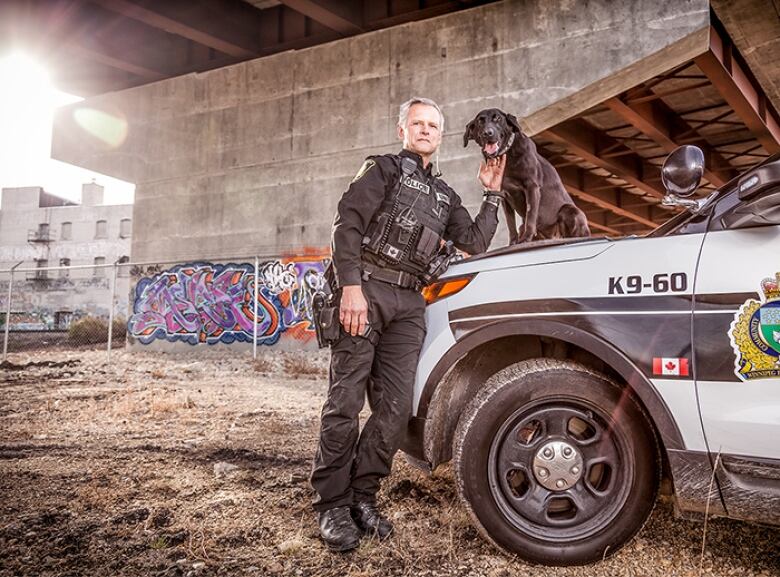Once a bony rescue dog, Jester the lab now sniffs out bombs for cops
Pooch makes unlikely rise through ranks in Winnipeg police K9 unit after months of 'ruff' training

Jester has defied the odds and risen from a once-skinny shelter pup to a certified bomb-sniffing dog with the Winnipeg Police Service.
"He's got unlimited potential," Sgt. WallyAntoniuksaid in a post on the Winnipeg Humane Society website. "He just gets better every day."
The pair are featured in the Winnipeg police 2018 calendar.
The two-year-old Labrador-border collie mix finished his first explosives training course in March and became an official bomb-detecting dog with Winnipeg police in May.

Jester iscapable of identifying 14 common explosives by scent,and about22,000 knowncombinations of those, according to the humane society.
The unlikelihood that Jester would ever evolve into such a skilled member of the police service makes his story all the more compelling.
The humane society says Jester was malnourished when he was first rescued, and workers learned he had been fed a diet that included macaroni and oatmeal.
The Winnipeg police canine unit doesn't typically adopt dogs from shelters, but the humane society alerted Antoniukto a few four-legged candidates in their care.Antoniuksaw something in Jester and began putting him through the paces.
"Anytime a dog with this kind of potential comes along, you wouldn't want to pass it up," Antoniuktold the humane society.
After graduating from the bomb detecting program in May following months of training, Jesterspent the next several months living with Antoniuk, who continued tohelp the special pooch hone his nose.
Jester's training program is known as the"can system." The exercises started as small, 30-second problem-solving challenges, where Jester would receive a treat if he couldsniff out which of several cans contained explosive material.
Antoniukgraduallyincreasedthe difficulty levelover time by adding more cans and extending the duration of exercises to the point where it would take Jester 20 minutes to complete a task (and get a tasty reward).
Jester put on weight and his health improved asAntoniukwatched the dog "transform from a malnourished and neglected dog to one with limitless drive and ability," the humane society writes on its website.
Now the pair are the ones who arrive on scenes in Winnipeg wherethere's been a bomb threat.
"Their bond not only strengthens with each day, but also helps make Winnipeg a safer city," the humane society says.
Jester continues to live and train withAntoniuk.
Jester was malnourished when he arrived at the shelter. Sometimes he was fed oatmeal and Kraft Dinner. Now he's trained to detect the scents of around 22,000 manufactured explosives as a bomb detector dog with @wpgpolice Read his incredible story here: https://t.co/NOU5OsNfcc pic.twitter.com/uegsnLj38F
—@TheWHS











_(720p).jpg)


 OFFICIAL HD MUSIC VIDEO.jpg)
.jpg)



























































































